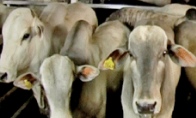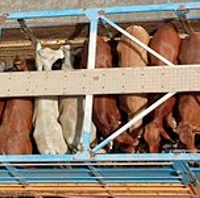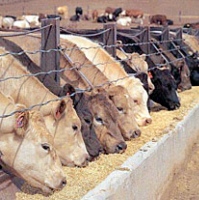- About Us
- Columns
- Letters
- Cartoons
- The Udder Limits
- Archives
- Ezy Reading Archive
- 2024 Cud Archives
- 2023 Cud Archives
- 2022 Cud Archives
- 2021 Cud Archives
- 2020 Cud Archives
- 2015-2019
- 2010-2014
- 2004-2009
 |
Rotten Apple Theories- |
Rotten apple theories cannot justify vicarious cruelty to Australian cud chewers
It seems strange that a Four Corners program of early June about the inhumane slaughter of cattle in Indonesia should cause such a furore in Australia. It is difficult to believe that so many viewers were surprised that such barbaric practices occur. While it is understandable that animal rights groups took advantage of the public outrage to mount a campaign against the export of live animals to the offending country, the response by politicians and farm lobby groups is bordering on hypocrisy.
Australia has a long and shameful history of exporting animals in appalling conditions. Live exports of sheep have attracted widespread condemnation for decades. The exporting authorities in the Australian Government usually react to criticisms in a grudging and piecemeal fashion. The general rule of thumb seems to be that a blind eye is turned to animal suffering until profits are threatened. When that approach becomes untenable, the authorities move to minimise the damage – not to the animals but to the industry’s profits. Following the Four Corners program, farm lobby groups were contacted by numerous beef producers expressing dismay at the treatment of the cattle they supplied to exporters. The lobby groups interpreted these expressions of dismay as outrage that one specific trading partner has betrayed the local industry and jeopardised exports globally.
Essentially, the lobby groups suggested that one rotten apple must not be allowed to ruin the barrel of cattle exports as a whole. They recommended concentrating on the immediate problem of inhumane conditions in Indonesia: a ban on exports to Indonesia might save the industry as a whole. The suggestion could work for a time perhaps, perhaps until the Four Corners investigators visited some other destination country. But when the Government put a temporary prohibition on exports to Indonesia, industry spokespersons complained that the problem was confined to a few operators among many Indonesian abattoirs, and that the Indonesian ban was too broad.
The only safe solution to this problem is to completely ban all exports of live animals for slaughter. Such a policy might also have positive spin-offs for the Australian environment. Many beef cattle are run on marginal lands that are unsuitable for pastoral agricultural purposes. Many others are fattened in feedlots that are extremely heavy on feed and water and create hazardous wastes. Feedlots are also of dubious ethical status in that they confine animals in very unnatural conditions. These conditions mean that husbandry practices are drug intensive, with the potential to contaminate the food chain.
These conditions mean that husbandry practices are drug intensive, with the potential to contaminate the food chain.
While some ‘family farms’ might feel threatened by a blanket ban on live exports, they will, as usual be exploited by the huge corporations who run the ‘factory farms’. The rhetoric of battling small farmers is so much better public relations than the cold calculations of remote investors. In any such sudden change of policy, the small producers might deserve some compensation but large speculators should accept that risks are intrinsic to their speculative enterprises.
Ideally, viewers should begin to ask whether Australia’s own slaughterhouses are humane. While it might seem virtuous to be aghast at the situation in Indonesian abattoirs, the sudden outbreak of conscience is chiefly attributable to the wide publicity of recent days. Given that most Australians are probably ignorant of the methods used to slaughter animals for domestic consumption, it is difficult for us to place our hands on our hearts and assert confidently that the meat we eat comes from animals that have been killed ‘humanely’. Australians are unlikely to cease being carnivores overnight, but we should face up to the processes necessary to put meat on our plates. There are sound aesthetic reasons for adopting the vegetarian option, or at least for eating less meat and choosing meat more carefully than wasteful supermarkets and fast food outlets might prefer.
Another interesting aspect of this case is that it focuses attention on two other recent exports. A recent tragedy involving an Australian soldier in Afghanistan seems to have been caused by a local man who was able to kill the Australian because he had been trained efficiently by our own military. It is a matter for deep regret that we export the techniques of killing. Prime Minister Gillard’s recent suggestion that Australia might soon have closer military ties with China should be a matter for some alarm. The usual argument is that sharing military activities helps to improve the professionalism of the military personnel of the other state, but no Australian government could ever guarantee that such skills will never be used against civilians or against Australian interests.
It is a matter for deep regret that we export the techniques of killing. Prime Minister Gillard’s recent suggestion that Australia might soon have closer military ties with China should be a matter for some alarm. The usual argument is that sharing military activities helps to improve the professionalism of the military personnel of the other state, but no Australian government could ever guarantee that such skills will never be used against civilians or against Australian interests.
The other obvious parallel is with refugee policy. The offshore solution has attracted widespread criticism ever since it was used by the Howard Coalition Government (1996-2007). The Labor Party was among the critics until it came to power and found that the despised ‘Pacific solution’ had its attractions. Keeping asylum seekers offshore means that the social and psychological trauma inflicted by long periods of mandatory detention are conveniently out of sight and so out of the minds of voters.
The same evasion of responsibility underlies both the export of animals and the export of people. If our treatment of those within our power is used as a criterion, then Australian political culture fails miserably to measure up to democratic standards. We have become accustomed to the notion that avoiding responsibility is good, but in the cases of live animals, techniques for killing and asylum seekers, exportation has become a definite evil.
Tony Smith has written on defence and foreign policy issues in the Australian Quarterly, the Australian Review of Public Affairs, Eureka Street, Online Opinion and Unleashed.
